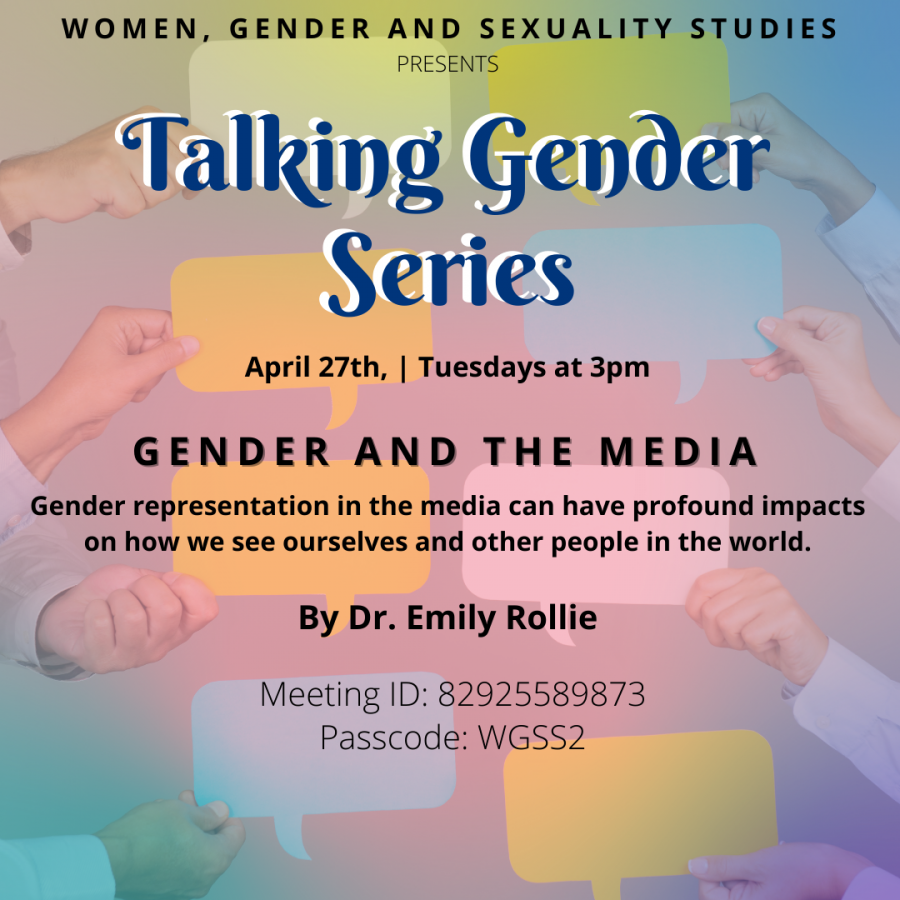Students and staff participate in Talking Gender series
May 5, 2021
Going to class is a normal part of attending a university, but it is more than just taking classes for a degree. College allows people to find who they are and make connections to learn about themselves. The Women’s Gender and Sexuality Studies Program (WGSS) collaborated with the Diversity and Equity Center to offer a series called Talking Gender.
Professor of Philosophy Cynthia Coe organized the event in order to offer students, faculty and staff an informal place to talk about gender and sexuality. Coe said the WGSS program wanted to create an online space where a community could be built around the issues of gender and sexuality.
“We just saw that there was a need and [we] wanted to reach out or at least provide a space for students to talk to each other about things they were interested in,” Coe said.
So far, there have been seven talks throughout winter and spring quarter and the topics ranged from the politicization of the hijab to gender-inclusive language. The topic of the talk on April 27 was gender and the media.
Emily Rollie, who is a professor in the department of theater arts, gave a short presentation and afterwards attendees could give their insight on the topic.
Rollie said women are often objectified and seen as an object of pleasure for men, compared to men who are often not objectified in a sexual manner for women.
“Films are shot from the male gaze which of course means that women are objectified often,” Rollie said. “They are often put in subjective positions, they’re often sexualized so we see just a part of their body on screen.”
Senior theatre studies major Eliot Reese said he noticed that gender in reality TV is stereotypical, seems very staged and clouds peoples’ view of what people are really like. An example Reese gave was Jersey Shore and how the actions of the people, mainly the men, were full of toxic masculinity.
“I’ve been thinking how ruggedly difficult it is to wrap our minds around gender in reality TV and how the men in [Jersey Shore] were so aggressively toxically masculine,” Reese said.
Junior political science major Allyssa Shea said it is interesting that people turn to fantasy shows in order to see different types of masculinity. Shea said in fantasy shows, viewers get both the stereotypical masculinity but also a male character who is kind and caring.
“It’s interesting to me that in our society we’ve made it a fantasy show that men can be different than how masculinity is regularly portrayed,” Shea said.
The depiction of male and female superheroes is vastly different as well, Rollie said. She said there are gender differences in the roles, appearance and violence. Female superheroes tend to be seen as companions and be inspired by a cause when fighting, whereas male superheroes are always ready to fight, according to Rollie.
Program Manager of the Diversity & Equity Center Justin Santoli said the character Harley Quinn is a good example of this because in Suicide Squad, which was directed by a man, a lot of the shots of her are framed in a sexual way and her outfit is very “skimpy.” But in the woman-directed Harley Quinn solo film, the outfits are much more covered and the shots “depict her in positions of power,” Santoli said.
“It’s those things that if you’re not looking at it through a critical lens … it really does send a completely different message of who this character is,” Santoli said.
Rollie said a lot of the time, film, TV and theatre try to perceive their audience but usually the actual audience is different from the perceived audience. There is a children’s literature study about how young women are more ready to accept a male protagonist than a young boy would be to accept a female protagonist, according to Rollie.
“There’s almost like a grooming of the consumer,” Coe said. “We’re being trained to accept these kinds of stories and find them familiar and comforting and nostalgic or whatever, so that seems really problematic.”
This idea is very ingrained in peoples’ minds and it is constantly produced for an audience who is going to buy into this idea and is used to shape the audience, Rollie said.
“Boys and men are socially trained not to identify with girls and women and this kind of identification tends to be socially punished,” Katelyn Watkins said.
The Talking Gender series will continue every Tuesday until May 18.



